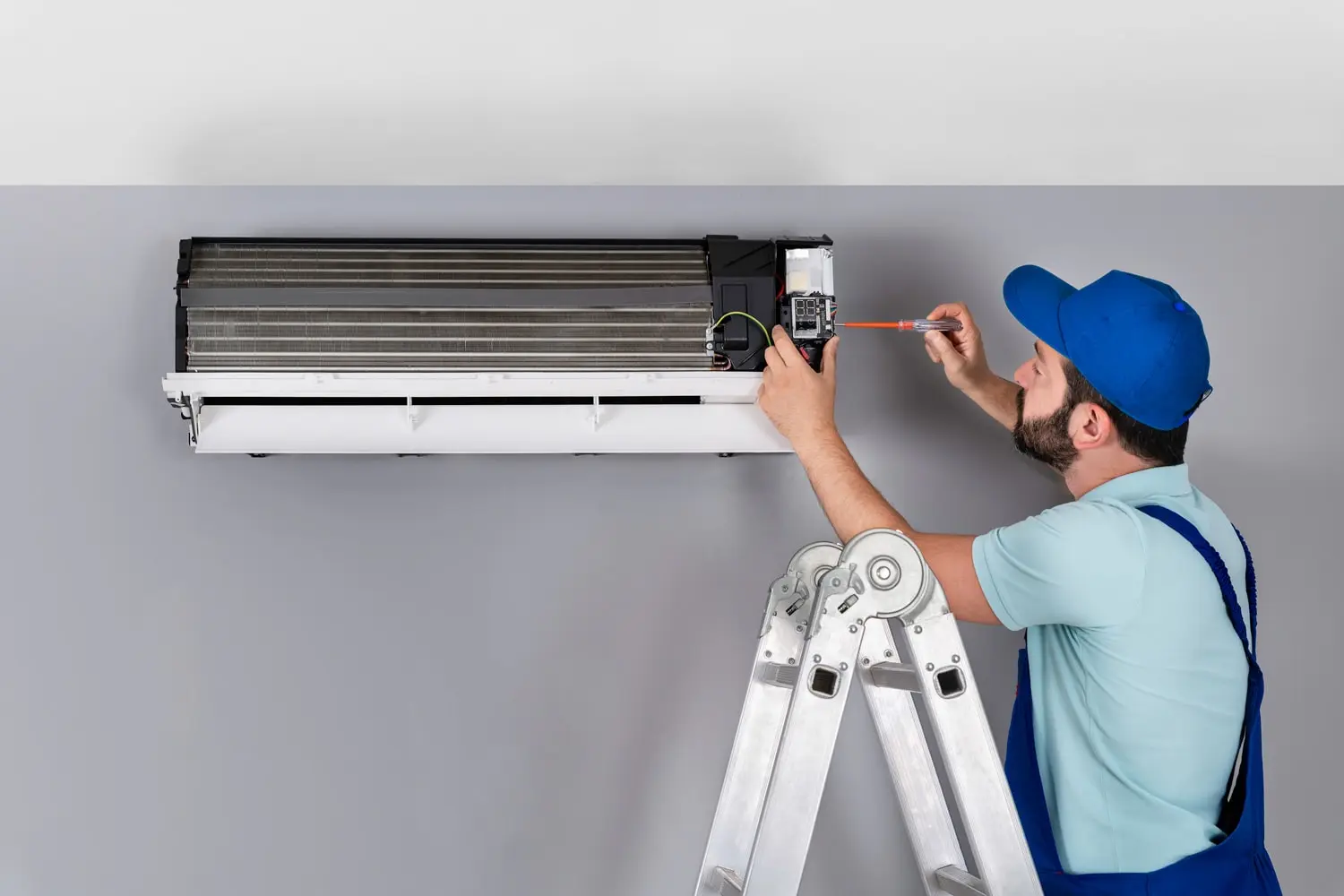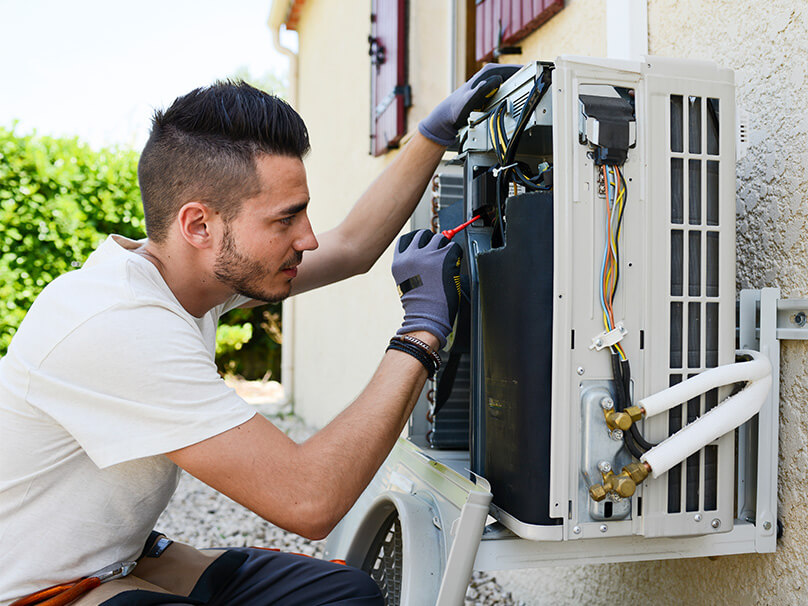Air Conditioning Repair Near Me Fundamentals Explained
Air Conditioning Repair Near Me Fundamentals Explained
Blog Article
The Definitive Guide for Air Conditioner Repair Near Me
AC Repair Near Me: Specialist Cooling System Remediation Guarantees Your Home Remains Comfortable Throughout The Year
Types of AC Systems
When taking on a/c repair work, understanding the type of air conditioning system you're dealing with can save time, cash, and irritation. Ever wondered why some units cool a room much faster than others? Or why specific systems appear to break down more often? Let's peel back the layers.
Central Air
Some Known Questions About Air Conditioner Repair Near Me.
Envision a cool breeze streaming through a whole house, whispering convenience into every corner. Central air conditioning systems do exactly that. They use a network of ducts to distribute cooled air, counting on a compressor and condenser outside, coupled with an evaporator coil inside. However when this complex monster fails, pinpointing the problem can be like finding a needle in a haystack.
Split Systems

Split systems are a popular option for numerous homes-- part indoor unit, part outdoor compressor. They offer versatility and performance, click here but their double nature means repair can include either element. Have you ever heard a strange sound outside your house just to discover the indoor unit isn't cooling? That's a classic sign of a split system glitch.
The 30-Second Trick For Air Conditioner Repair Near Me
Window Units
These compact warriors battle summertime heat by fitting snugly into a window frame. They integrate all components into a single box. Their simplicity frequently suggests fewer repair headaches, however overlooking filters or permitting debris buildup can lead to lessened performance or breakdowns.
Ductless Mini-Splits
Rumored Buzz on Air Conditioning Repair Near Me
Ductless systems bypass ductwork entirely, making them perfect for homes without existing ventilation. They're peaceful, effective, and remarkably resilient. Yet, when repair work are needed, service technicians should be proficient at dealing with refrigerant lines and electrical connections-- no small accomplishment.
Quick Recommendation Table
| Type | Key Includes | Common Repair Work Issues |
|---|---|---|
| Central Air | Ductwork, whole-house cooling | Duct leaks, compressor failure |
| Split System | Indoor & & outdoor systems | Refrigerant leakages, fan motor concerns |
| Window Unit | All-in-one, simple setup | Dirty filters, electrical faults |
| Ductless Mini-Split | No ducts, zoned cooling | Line leaks, sensor breakdowns |
The smart Trick of Fix Air Conditioner That Nobody is Talking About
Unwinding one of the most Frequent Air Conditioner Issues
Have you ever wondered why your air conditioner suddenly stops cooling throughout a sweltering afternoon? One typical perpetrator is an unclean or clogged air filter. This tricky villain restricts air flow, requiring your system to work overtime, which not only reduces performance however can likewise result in early breakdowns. Envision trying to breathe through a headscarf soaked in dust-- it's exhausting!
Another frequent misstep is refrigerant leakages. These undetectable leakages don't just decrease cooling power but can also damage the compressor, the heart of your AC unit. How frequently do you examine for uncommon hissing noises or ice formation on the coils? Capturing these signs early can conserve you from pricey repairs down the line.
Beyond the Fundamentals: Lesser-Known Issues
The Main Principles Of Air Conditioner Repair Near Me
Sometimes, the thermostat itself is the nuisance. Miscalibrated or faulty thermostats send out combined signals, triggering the AC to cycle erratically. Ever knowledgeable your a/c switching on and off in quick succession? That's called brief cycling, a sly effectiveness drainer that can wear parts faster than you 'd anticipate.
Electrical problems, such as used wiring or a malfunctioning capacitor, might lurk beneath the surface. Fix Air Conditioner. These frequently manifest as AC units stopping working to start or unexpectedly closing down. An expert eye understands to test these components with precision tools, something a casual glance won't reveal
Professional Tips for Diagnosing Common A/c Issues
The smart Trick of Air Conditioner Repair Near Me That Nobody is Discussing
- Examine and replace air filters routinely-- every 1 to 3 months depending on use and environment.
- Listen for uncommon noises like rattling or buzzing that could signal loose parts or electrical faults.
- Check the outside unit for particles or obstructions that hamper airflow and trigger overheating.
- Look for frost accumulation on evaporator coils, a hint towards refrigerant issues or air flow limitations.
- Check the thermostat settings and recalibrate if the temperature level readings feel off.
Quick Referral Table: Symptoms & & Probable Causes

| Symptom | Probable Cause | Professional Tip |
|---|---|---|
| Warm air blowing | Low refrigerant or filthy coils | Tidy coils and look for leakages immediately |
| Short biking | Thermostat problems or large system | Change thermostat settings and speak with sizing guidelines |
| System will not begin | Electrical faults or capacitor failure | Test wiring and change capacitors as required |
| Water leak | Blocked drain line or frozen evaporator | Clear drain lines and inspect for coil icing |
DIY AC Maintenance Tips
Examine This Report on Air Conditioning Repair
Ever discovered your a/c sputtering like an old engine on a hot summer day? Neglecting subtle signs frequently indicates more than just a sweaty afternoon-- it's a start to unforeseen air conditioner repair work costs. What if you could capture those whispers before they turn into wails? Regular do it yourself upkeep can be your very first line of defense.
Simple Actions to Keep Your Air Conditioner Running Smoothly
Air Conditioning Repair for Beginners
- Tidy or Replace Filters: A clogged filter is like attempting to breathe through a scarf. Every 1-3 months, inspect and switch out your filters. It enhances airflow and effectiveness, avoiding compressor strain.
- Inspect the Condenser Coils: Dust and debris serve as undetectable blankets smothering your unit's cooling power. Carefully brush or vacuum the coils, but avoid extreme chemicals that might deteriorate the metal.
- Check the Drain Line: When was the last time you glanced at your drain pan? A stopped up drain can trigger water leakages and foster mold development. Flushing it with a vinegar solution monthly keeps the circulation clear.
- Seal and Insulate: Are your ductworks whispering leakages? Sealing spaces with mastic or foil tape improves efficiency and reduce uneven cooling.
Pro Tips Beyond the Basics
- Step your system's voltage to catch subtle electrical wear before it stimulates big issues.
- Listen for uncommon hums or rattles-- these acoustic breadcrumbs frequently signify loose parts or stopping working motors.
- Keep outdoor units shaded however make sure a minimum of 2 feet of clearance around them for optimal airflow.
Ask yourself: Are you hearing your air conditioning's peaceful SOS or just awaiting it to scream? Requiring time for DO IT YOURSELF air conditioner upkeep transforms reactive repair into proactive care, conserving sweat, tension, and yes, cash.
A Biased View of Repair Air Conditioner Near Me
Why Know-how in Air Conditioning Repair Matters
Envision this: your a/c unit sputters and groans throughout a scorching afternoon, leaving you sweltering inside. Would you trust a beginner fumbling with fragile elements, or would you look for the reassurance of a expert a/c service technician!.?.!? The intricacies of modern a/c systems require accuracy and experience. A minor mistake can intensify a minor breakdown into an expensive catastrophe.
Things about Fix Air Conditioner
Hidden Intricacies Behind the Cool Breeze
Many ignore the layers hidden below the streamlined exterior of an air conditioning unit - Fix Air Conditioner. From refrigerant leaks that silently drain pipes effectiveness to faulty thermostats that misread temperatures, these concerns need more than a fundamental toolkit. Professionals have an eager eye for diagnosing problems that average property owners neglect
Important Tips for Choosing the Right Professional
Ac Fixing Can Be Fun For Anyone
- Certification and Training: Confirm qualifications; a service technician trained in the newest heating and cooling innovations is important.
- Experience with Particular Systems: Not all AC units are created equal; find someone acquainted with your model's peculiarities.
- Diagnostic Approach: Knowledgeable specialists utilize sophisticated tools-- like electronic leak detectors and thermal imaging-- to determine surprise faults.
What to Get out of a Pro's Diagnostic Process
| Step | Purpose | Professional Insight |
|---|---|---|
| Visual Examination | Recognize apparent wear or damage | Look for rust or unusual sounds-- an indication frequently overlooked |
| Pressure Testing | Discover refrigerant leakages | Subtle pressure drops can hint at micro leaks unnoticeable to the naked eye |
| Electrical Checking | Ensure circuit stability | Loose connections can imitate extreme mechanical failures |
Ac Fixing Fundamentals Explained
Why Do It Yourself Frequently Falls Short
Appealing as it is to tinker with your air conditioner system, DIY fixes often miss the root cause. For example, topping off refrigerant may temporarily cool your space but ignores leakages that worsen with time. Expert technicians don't just patch symptoms; they pursue the underlying mechanical and electrical faults that sap efficiency.
The Air Conditioning Repair Statements
Questions to Ask Before Hiring
- What diagnostic tools do you use to recognize problems?
- Can you describe the repair work process and expected outcomes?
- Are you familiar with the refrigerants suitable with my unit?
- Do you follow safety protocols for dealing with electrical parts?